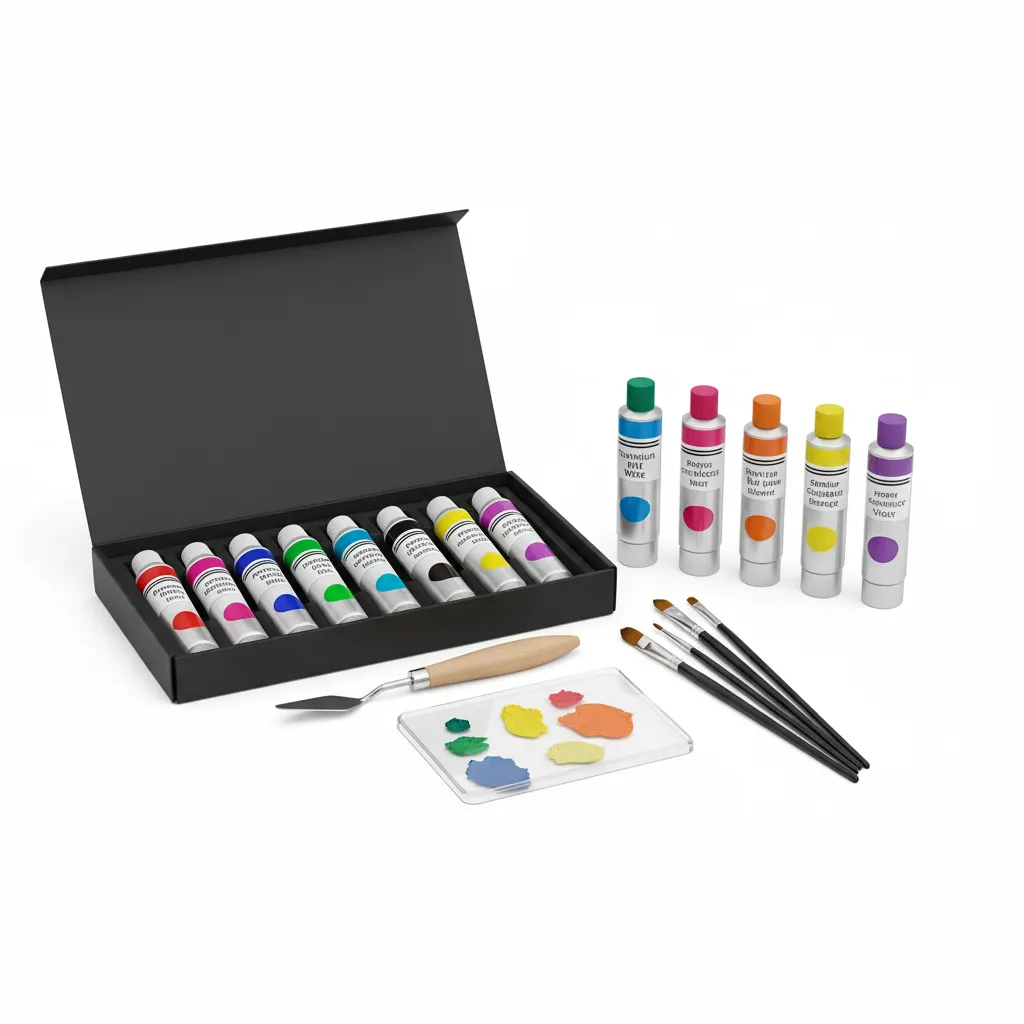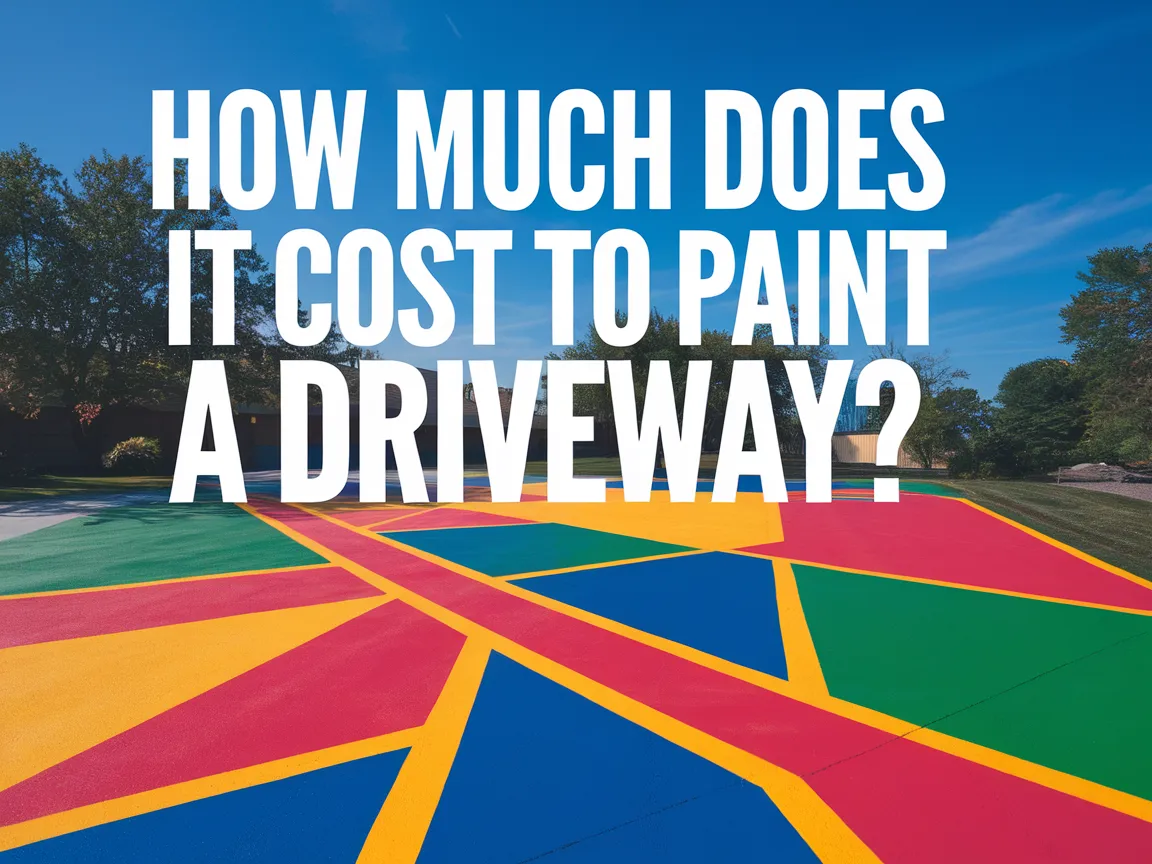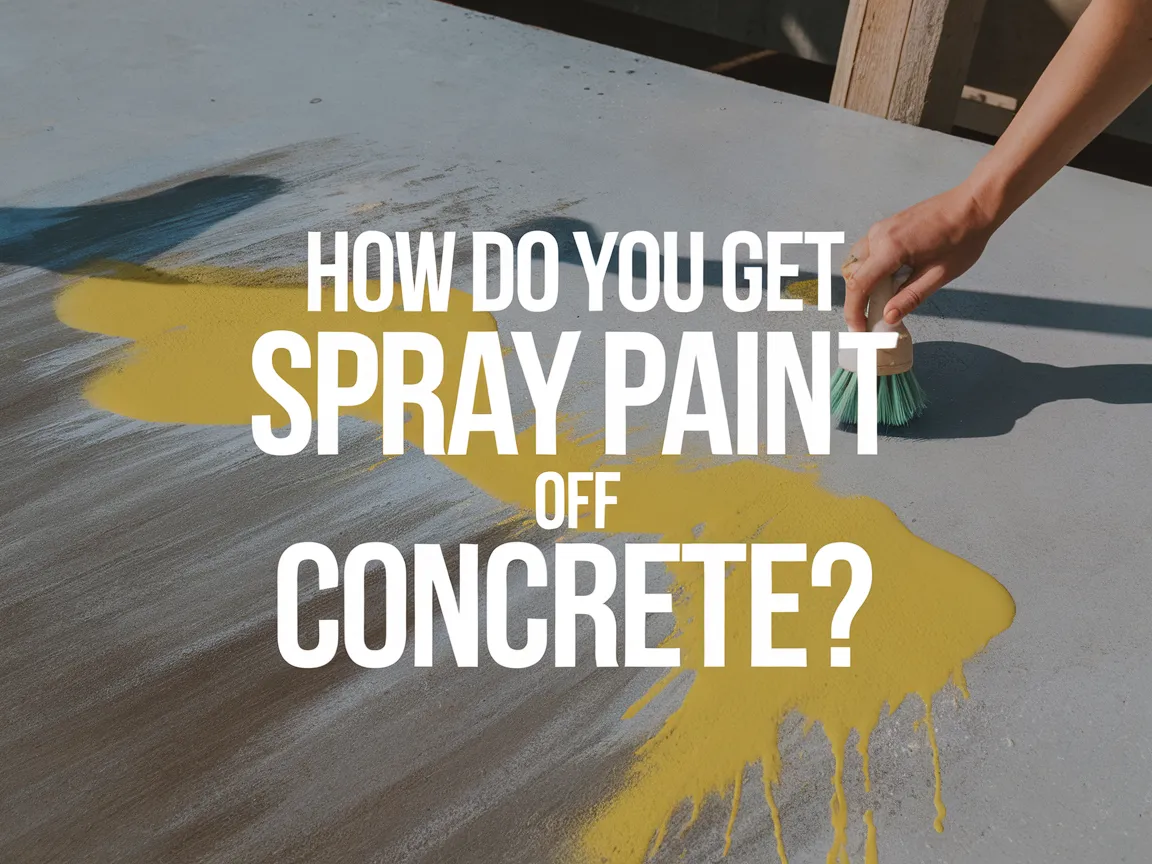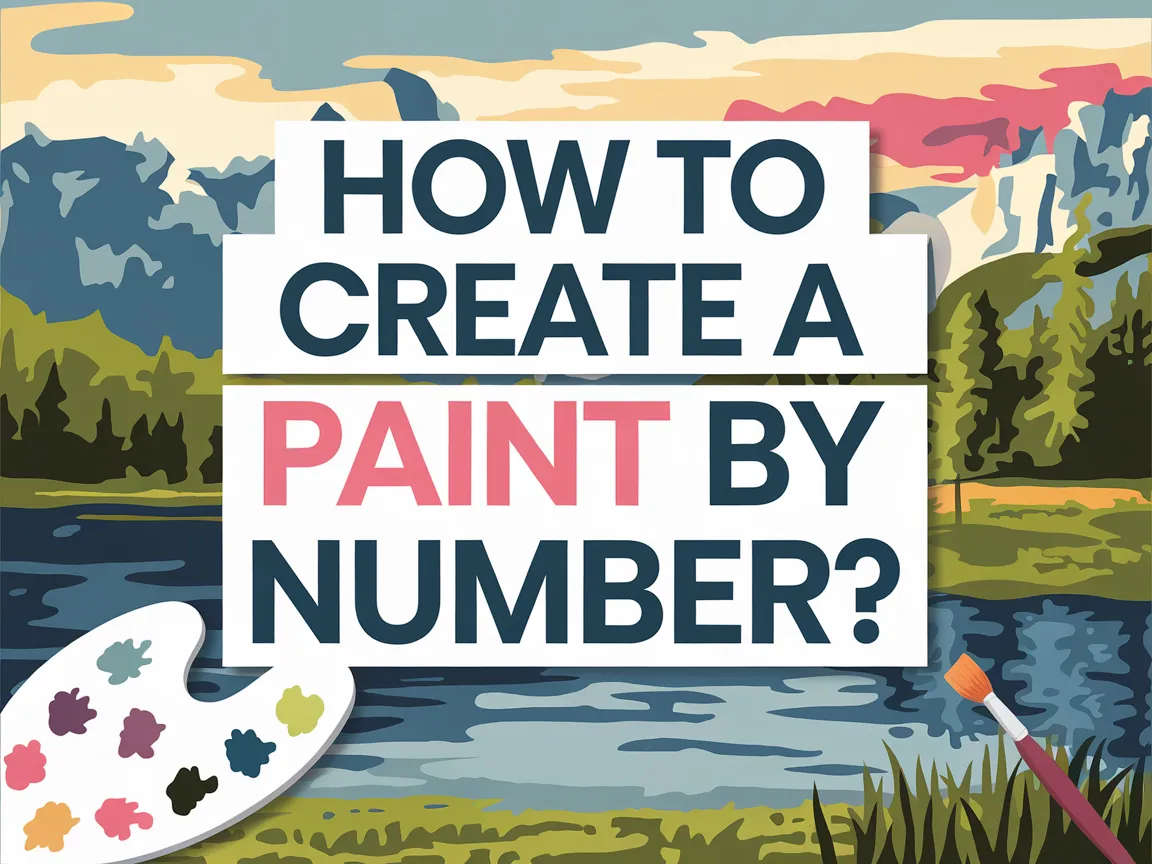Can You Pressure Wash Paint Off Concrete?
Published on: May 2, 2025 | Last Updated: January 7, 2025
Written By: Alisha Winters
Concrete is a strong, hard surface made from a mix of sand, gravel, and cement. Think of it as a giant, solid cake that people use for sidewalks, driveways, and buildings.
So, can you pressure wash paint off concrete? It’s crucial to know because removing paint properly can save you time and effort, and I’ve learned that the hard way! Trust me, following the right steps keeps your concrete looking fresh.
In this article, I’ll cover important considerations before you start, a step-by-step guide for pressure washing, common types of paint on concrete surfaces, factors that affect the washing effectiveness, and common issues you might encounter. Plus, we’ll dive into finishing touches and DIY project ideas for your concrete after paint removal, helping answer questions like how do you remove paint from concrete or what takes spray paint off concrete.
Contents
- 1 Can You Pressure Wash Paint Off Concrete?
- 2 What is Concrete?
- 3 Important Considerations Before You Start
- 4 Step-by-step Guide to Pressure Washing Paint Off Concrete
- 5 Types Of Paint Commonly Found on Concrete Surfaces
- 6 Factors Affecting the Effectiveness Of Pressure Washing
- 7 Common Issues Encountered When Pressure Washing Paint Off Concrete
- 8 Environmental Impact of Pressure Washing Paint Off Concrete
- 9 Comparative Effectiveness: Pressure Washing vs. Other Paint Removal Methods
- 10 Finishing Touches: Ensuring a Clean and Ready Surface
- 11 Long-Term Maintenance for Clean Concrete Surfaces
- 12 Cost Analysis: Pressure Washing Paint Off Concrete
- 13 Frequently Asked Questions About Pressure Washing Paint Off Concrete
- 14 Conclusion: Successfully Removing Paint From Concrete Surfaces
- 15 Additional Resources
Can You Pressure Wash Paint Off Concrete?
Yes, you can pressure wash paint off concrete. Use a pressure washer with at least 3,000 psi (Pounds Per Square Inch) for best results. Combine it with a paint remover for tough stains. Always test a small area first! If you’re considering repainting after removal, you might want to explore chalk paint application techniques.
What is Concrete?
Concrete is a composite material made of aggregates like sand, gravel, or crushed stone, bonded with cement and water. A typical ratio of 1:2:3 refers to cement, sand, and coarse aggregates by volume, creating a robust structure with a compressive strength of up to 40 MPa (Megapascals) or about 5800 psi (Pounds Per Square Inch).
You might wonder, can you pressure wash paint off concrete? I remember my own trials when cleaning paint splatters off my patio. It took various methods to see what worked best.
A friend used it for their concrete driveway after a DIY spray paint job went wrong. They struggled with leftover paint and asked me how to remove paint from concrete. We explored several options and realized a pressure washer was crucial for their cleanup—it was a hassle but a lesson learned! We also discussed how challenging it can be to paint over peeling paint on concrete, something they hadn’t anticipated. If you’re dealing with similar paint mishaps, you might want to explore professional touch-up paint solutions.
Important Considerations Before You Start
What do you need for pressure washing paint off concrete?
- Pressure Washer: You’ll need a pressure washer like the Sun Joe SPX3000 (1,800 Psi). It has enough power to lift paint from concrete surfaces.
- Paint Stripper: Consider using Citristrip Paint and Varnish Stripping Gel. It softens the paint, making it easier to wash away.
- Safety Gear: Wear safety goggles and gloves, like the 3M WorkTunes Hearing Protector. Always prioritize safety from debris and harmful chemicals.
- Degreaser: Use a concrete cleaner with an industrial degreaser, such as Zep Heavy-Duty Concrete Cleaner, to prepare the area properly.
We have now covered key considerations before beginning. The next section will provide a step-by-step guide for pressure washing paint off concrete.
Also See: What is 5D Diamond Painting? Discover Its Charm!
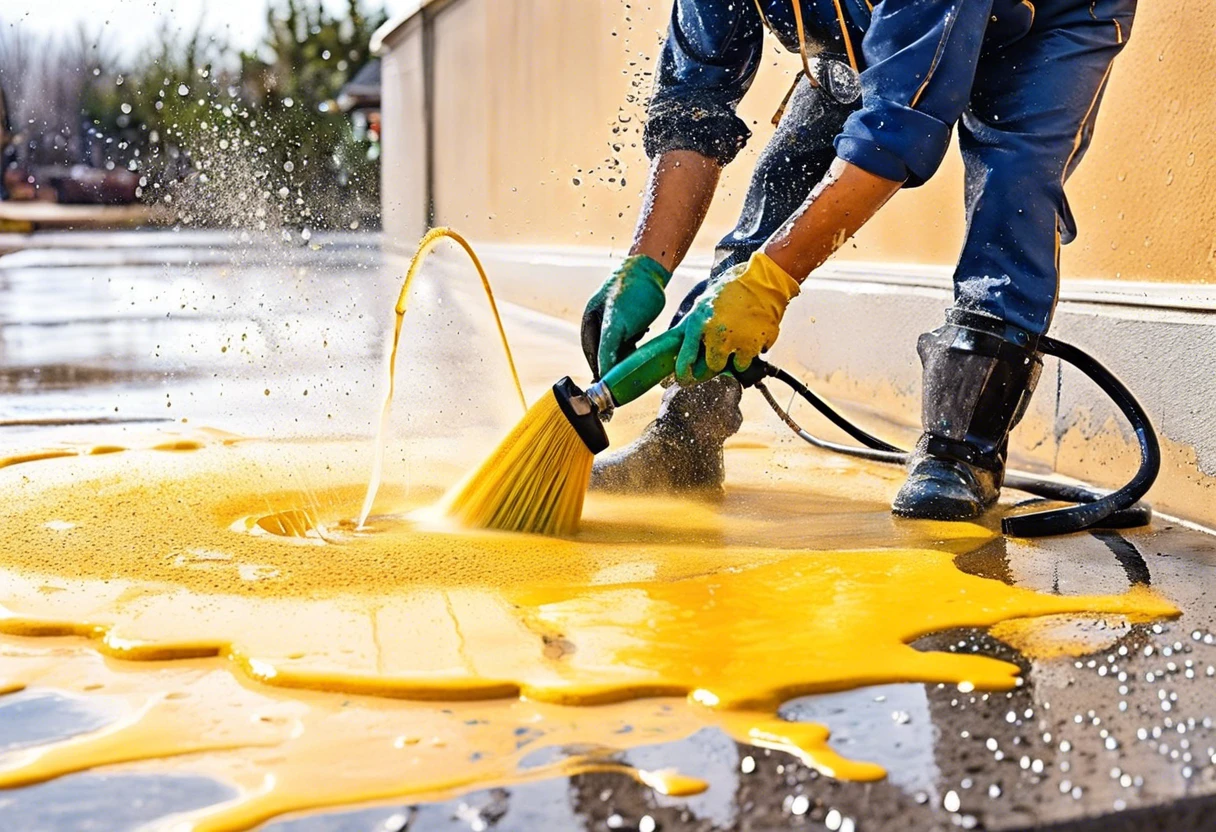
Step-by-step Guide to Pressure Washing Paint Off Concrete
This guide covers the steps to effectively remove paint from concrete using pressure washing.
-
Prepare the Area
Clear the area of furniture and obstructions. Cover nearby plants with plastic sheeting to protect them from the pressure washer’s spray.
It’s also wise to wet the surrounding soil to help prevent chemicals from seeping in. A little preparation goes a long way when tackling stubborn paint.
-
Select the Right Pressure Washer
Choose a pressure washer rated at least 3000 psi (Pounds Per Square Inch). This power will lift even the toughest paint stains from concrete.
Consider using a fan tip or rotary nozzle for optimal dispersal. This helps avoid damaging the concrete while effectively removing the paint.
-
Apply a Paint Stripper
Use a commercial paint stripper designed for concrete. Work in small sections for an even application; let it sit for 15 to 30 minutes or follow the product’s label instructions.
Follow the manufacturer’s recommended dwell time for the best results. Rushing can leave leftover paint, undoing your hard work.
-
Pressure Wash the Concrete
Start washing from the top and work down to prevent paint drips from settling back onto the concrete. Use a consistent motion, sweeping the wand left to right while keeping the nozzle about 12 inches (30 Cm) from the surface. When preparing concrete surfaces for painting, you might want to explore specific techniques for painting cement board effectively.
For tougher spots, rinse back and forth over the area multiple times. Adjust the pressure as needed to avoid damaging the surface, but don’t hesitate to increase it for stubborn areas.
-
Rinse and Dry the Surface
After pressure washing, thoroughly rinse the area with clean water to remove any residual paint stripper. Ensure all chemicals are washed away to avoid surface damage.
Finally, allow the concrete to dry completely before walking or working on it. Keeping the surface dry helps prevent future paint splatters or stains.
You should now have a good understanding of effectively removing paint from concrete surfaces. In the next part, we’ll discuss common types of paint found on concrete.
Types Of Paint Commonly Found on Concrete Surfaces
Let’s discuss the types of paint: Acrylic, Epoxy, Oil-Based, and Latex paint.
-
Acrylic Paint
Acrylic paint is water-based, making it easy to clean. You can pressure wash it off concrete using 2500 PSI (Pounds Per Square Inch) with a 25° nozzle.
Recommended SuppliesAs an Amazon Associate, I earn from qualifying purchases. Images are representativ and not actual product images. -
Epoxy Paint
Epoxy paint is extremely durable. Pressure washing it off concrete may require 3000 PSI and a heat attachment.
-
Oil-based Paint
Oil-based paint is tough and requires chemical solvents for removal. Pressure washing may not be effective unless combined with a heavy-duty solution.
-
Latex Paint
Latex paint is also water-based but adheres strongly to concrete pores. Removing it might require hot water and around 2000 PSI for effective removal.
In my experience, I’ve found Acrylic paint the easiest to remove. Its water-based formula and lower PSI requirements lead to quick, hassle-free results.
We have now covered various types of paint commonly found on concrete surfaces. Next, we will discuss factors influencing pressure washing effectiveness.
Factors Affecting the Effectiveness Of Pressure Washing
What factors influence the success of removing paint from concrete surfaces?
-
Type of Paint: Different paints dissolve differently; oil-based paints resist pressure washing better than latex paints.
-
Pressure Level: Insufficient pressure (Below 1,500 PSI) might not break tough paint bonds on concrete.
-
Surface Condition: Uneven or textured surfaces trap paint, while smooth concrete allows for easier paint removal.
-
Temperature and Weather: Cold or wet conditions slow drying, while heat can enhance paint removal efficiency during washing.
We have now covered the elements influencing pressure washing effectiveness. Next, we will address typical challenges faced when removing paint from concrete.
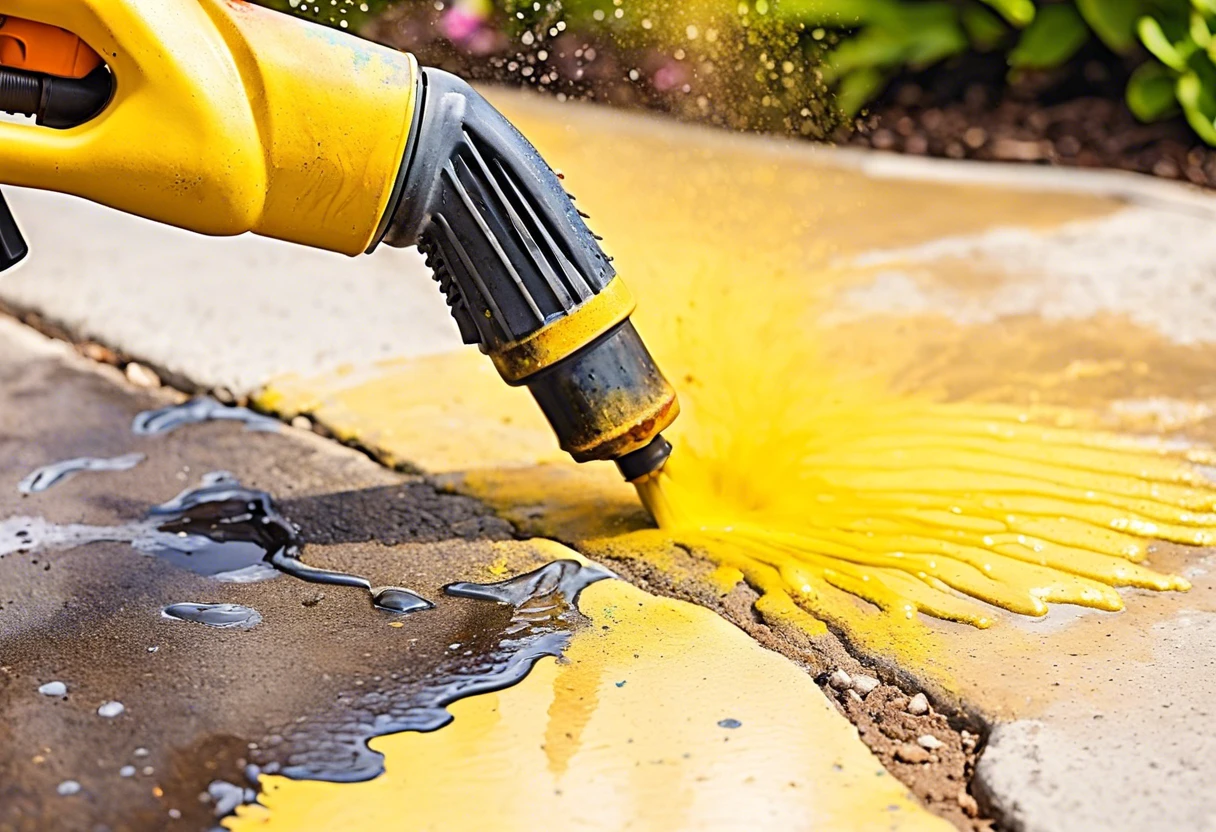
Common Issues Encountered When Pressure Washing Paint Off Concrete
My friend tried pressure washing paint off her driveway. The paint wouldn’t budge, and she ended up damaging the concrete. Ouch!
To avoid that, use 3000 PSI (Pounds Per Square Inch) with a fan tip. Always start at a distance. If that doesn’t work, rent a chemical stripper (Remover) like methylene chloride for tougher jobs.
Environmental Impact of Pressure Washing Paint Off Concrete
Pressure washing can have environmental effects. Let’s break it down.
-
Water Usage
Using a pressure washer consumes about 4-8 gallons (15-30 liters) of water per minute. If you’re washing for an hour, that adds up to over 200 gallons (757 liters)! Be mindful of conserving water when cleaning.
-
Chemicals Used
Some paint strippers contain harsh chemicals. They can run off into storm drains, affecting local waterways. Opt for eco-friendly options like plant-based strippers whenever possible.
Comparative Effectiveness: Pressure Washing vs. Other Paint Removal Methods
How does pressure washing stack up against other removal techniques? Let’s compare.
| Method | Effectiveness | Time Required | Cost |
|---|---|---|---|
| Pressure Washing | High (2000-3000 PSI) | 30 mins – 2 hrs | $50-$150 (rental/consumables) |
| Chemical Stripper | Moderate to High | 1-3 hrs (includes dwell time) | $20-$60 (for chemicals) |
| Hand Scraping | Low to Moderate | Varies (often long) | Low ($5-$20 for tools) |
| Baking Soda Blasting | Moderate | Varies (Up to 1-2 hrs) | $30-$100 (for materials) |
Finishing Touches: Ensuring a Clean and Ready Surface
After you’ve stripped the old paint from your concrete, apply a high-quality concrete sealant. Choose a product like Thompson’s WaterSeal, and let it cure at 60°F (16°C) for 24 hours before use. Professional painters often recommend specific paint brands that work best for different surfaces, and I discovered some interesting details about professional painting techniques.
Inspect the surface for any remaining paint spots. Use a fine brush with a generous amount of TSP (Trisodium Phosphate) cleaner, especially on tough spots. Use a 30% cleaner solution to improve results. When preparing exterior surfaces, choosing the right painting materials can significantly impact your home’s overall aesthetic and durability.
Here’s a tip: After pressure washing, blast any remaining spots with a high-temperature steam washer set at 250°F (121°C) to lift stubborn paint edges around pitted concrete.
Long-Term Maintenance for Clean Concrete Surfaces
Once you’ve successfully removed paint, keeping your concrete looking new is key. Here’s how to maintain that fresh look!
-
Regular Cleaning
Clean your concrete surfaces regularly with a broom or pressure washer. A quarterly deep clean helps prevent paint buildup and stains.
-
Sealing Your Concrete
After washing, consider sealing your concrete with a high-quality sealant every 1-3 years. This protects against stains and moisture.
-
Addressing Stains Promptly
If stains do occur, tackle them quickly! Use a mix of white vinegar and water (1:1 ratio) for most stains before they set in.
Cost Analysis: Pressure Washing Paint Off Concrete
Understanding the costs involved can help you decide whether to DIY or hire a pro!
| Task | Estimated Cost | Time Required |
|---|---|---|
| DIY Pressure Washing | $50 – $150 (rental) | 1 – 2 hours |
| Professional Service | $200 – $500 | 1 – 3 hours |
| Chemical Stripper Application | $20 – $60 | 1 – 3 hours (includes dwell time) |
Frequently Asked Questions About Pressure Washing Paint Off Concrete
Can You Remove All Types Of Paint From Concrete With Pressure Washing?
Yes, you can remove all types of paint from concrete with pressure washing, but it depends on the paint’s thickness and age. For effective removal, you often need 2000-3000 psi (14-21 Mpa) pressure and a suitable nozzle.
Is Pressure Washing Concrete Safe for All Surfaces?
No, pressure washing concrete isn’t always safe for all surfaces. Certain decorative finishes can get damaged due to high pressure, potentially increasing repair costs by 50% or more.
What Tools Are Necessary for Pressure Washing Paint Off Concrete?
For pressure washing paint off concrete, you’ll need a pressure washer with at least 2000 psi (14 Mpa), a turbo nozzle for efficiency, and a detergent designed for paint removal. This gear ensures quicker and better results. If you’re considering alternative paint removal techniques, painting over existing surfaces might offer another strategic approach.
How Long Does It Take to Pressure Wash Paint Off Concrete?
It takes about 30 minutes to 2 hours to pressure wash paint off concrete, depending on paint thickness and area size. A project like a patio might involve further prep time for best results.
What Should I Do if the Paint Doesn’t Come Off Completely?
If the paint doesn’t come off completely, consider using a chemical paint stripper. These solutions work well in softening paint; more detailed techniques often eradicate residual stubborn patches. Professional painters often recommend exploring the nuanced reasons behind automotive paint’s complex pricing.
Can You Paint Over Peeling Paint on Concrete?
No, don’t paint over peeling paint on concrete; it leads to further issues. Always scrape or clean affected areas thoroughly before any new application to ensure a lasting finish.
How Do You Remove Spray Paint From Concrete?
You can remove spray paint from concrete using a combination of a pressure washer and a paint stripper. Typically, methods that involve both give the best results for tough jobs.
What Can I Use to Clean Paint From Concrete?
You can use pressure washing, chemical strippers, or even baking soda blasting to clean paint from concrete. Choose the method you’re comfortable with and that suits your situation; certain options are eco-friendlier. If you’re considering painting your concrete surfaces afterward, concrete surface painting techniques are essential to understand.
Does Water Softener Help With Pressure Washing Concrete?
Yes, a water softener does help with pressure washing concrete. Hard water can create mineral deposits; soft water enables more effective detergent use and prevents residue buildup after washing.
Conclusion: Successfully Removing Paint From Concrete Surfaces
We covered the essential aspects of pressure washing paint off concrete, including types of concrete, important considerations, a step-by-step guide, common paint types, factors affecting pressure washing effectiveness, common issues, finishing touches for a clean surface, and DIY project ideas after paint removal.
So, can you pressure wash paint off concrete? Yes, with the right pressure, typically between 2,000 to 3,000 PSI, and appropriate techniques, you can effectively remove paint, making your surfaces clean and ready for reuse. For additional tips and support on cleaning concrete, feel free to explore more resources.
For further insights and expert advice, visit Paint Answers, where you’ll find a wealth of information on techniques, tips, and best practices.
Additional Resources
- Betti, C., & Sale, T. (2012). Drawing: A Contemporary Approach (6th ed.). Belmont, CA: Cengage Learning.
- Concrete paint removal | Pressure Washing Institute – XenForo
- How To Remove Paint from Concrete – This Old House
- How to Remove Paint From Concrete
Experienced interior designer with 15+ years in transforming spaces, blending artistry with expertise in color and design. Rhode Island School of Design graduate, specializing in restorations and modern makeovers.
Concrete, Material

